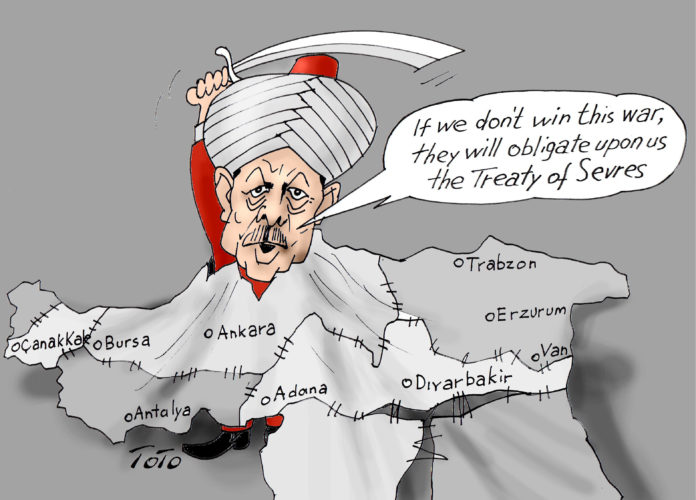By Edmond Y. Azadian
The borders and the very existence of the modern Republic of Turkey are defined by two major treaties which were signed early in the 20th century; the first was the Treaty of Sevres of 1920 and the second, the Treaty of Lausanne of 1923. The latter annulled the former, thereby preventing further partition.
The Sevres Treaty was meant to bring justice for minorities which had suffered the indignation of slavery for six centuries under the Ottoman yoke.
Turkey’s participation in World War I at the side of Germany spelled disaster and broke up the Ottoman Empire. Military tribunals were held in Istanbul and the Ittihadist rulers were convicted and several were executed as war criminals. But above all, the treaty officially mandated former raya nationalities to become independent states, carving their historic homelands out of the Ottoman Empire.
But a charismatic leader, Mustafa Kemal, who was no less a criminal than the Ittihadist rulers, managed to convince the signatories of the Sevres Treaty to void its stipulations and with the collusion of former Ittihadist apparatchiks, he rescued Turkey from further fragmentation. He successfully used the fledgling Bolshevik regime in Moscow against the West and he was able to wrest from them a new treaty which was signed in Lausanne, Switzerland in 1923, where the territorial claims of the Armenians and Kurds were replaced by vague clauses, supposedly defending minority rights. Since 1923, Turkish authorities have used and abused the stipulations of that treaty whimsically, thumbing their noses at the very powers which pretended that they had guaranteed minority rights in Turkey. That was a quite a feat for a defeated country.
Turkey’s current president, Recep Tayyip Erdogan, had been complaining recently that the Lausanne Treaty had been unfair for Turkey, especially the transfer of littoral islands to Greece. As if that were not a big enough gift for a defeated country, he had given himself up to Ottoman nostalgia, claiming Mosul in Iraq as well as territory in Syria, as the heir of the Ottoman Empire. Never mind that the empire had also left behind a legacy of genocide, which the successor state still refuses to recognize.








